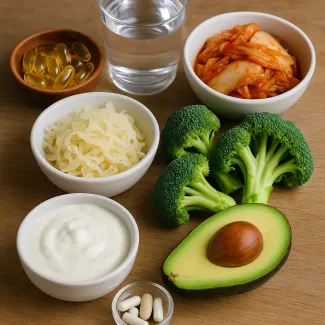
Natural strategies to improve digestion and support immune strength after 50
Why gut health and immunity become more important after 50
As we age beyond 50, our body experiences significant changes that affect both the digestive system and the immune system. The natural slowdown of metabolism, reduced enzyme production, and alterations in the gut microbiota can lead to digestive discomfort, nutrient absorption issues, and a weaker immune response. At the same time, the risk of infections and chronic diseases increases, making it essential to focus on gut health and immune resilience. Understanding how these systems work together allows you to make informed choices that promote overall well-being and longevity.
The link between digestion and immune function
The gut microbiome plays a crucial role in maintaining a balanced immune system. About 70% of the body’s immune cells are found in the gut lining, where they interact with beneficial bacteria and defend against harmful pathogens. When the gut flora is out of balance, the immune response can become either weakened or overactive, leading to issues such as inflammation, autoimmune reactions, and increased susceptibility to infections. Supporting the microbiome is one of the most effective ways to maintain both digestive health and immune strength after 50.
Signs that your gut and immune health need attention
Recognizing the signs of gut imbalance or a weakened immune system can help you take action early. Common symptoms include:
- Frequent bloating or gas
- Irregular bowel movements
- Persistent fatigue
- Recurring infections
- Slow wound healing
- Unexplained skin irritations
- Food sensitivities
Addressing these symptoms with lifestyle adjustments can significantly improve your quality of life.
How dietary choices can boost gut health after 50
Your diet is one of the most powerful tools for supporting the gut. After 50, it’s important to include foods that nourish the microbiome and promote healthy digestion. Key recommendations include:
- Adding fiber-rich foods such as oats, barley, lentils, and flaxseeds to support regularity
- Including fermented foods like yogurt, kefir, sauerkraut, and kimchi for natural probiotics
- Choosing plant-based meals that provide antioxidants and reduce inflammation
- Drinking plenty of water to aid digestion and prevent constipation
- Reducing intake of ultra-processed foods and refined sugars that can harm beneficial bacteria
The role of probiotics and prebiotics in gut health
Probiotics
Probiotics are live bacteria that provide health benefits when consumed in adequate amounts. They help restore the balance of the gut microbiota, enhance the gut barrier, and modulate the immune response. Sources include:
- Yogurt with live cultures
- Kefir
- Miso
- Tempeh
- Fermented vegetables
Prebiotics
Prebiotics are types of fiber that feed the beneficial bacteria in your gut. They support the growth of probiotics and help maintain a healthy gut ecosystem. Good sources are:
- Garlic
- Onions
- Leeks
- Asparagus
- Bananas
Including both probiotics and prebiotics in your daily meals helps create an environment where your microbiota can thrive.
Hydration and its impact on digestion
Proper hydration is essential for maintaining gut motility and supporting the mucosal lining that protects against pathogens. Dehydration can contribute to constipation and sluggish digestion. Aim for regular intake of:
- Water
- Herbal teas
- Broth-based soups
Limiting alcohol and caffeinated drinks can also protect the digestive system.
Managing stress to protect your gut and immunity
Chronic stress has a direct impact on both the gut and the immune system. It can disrupt the gut-brain axis, alter the microbiome, and increase inflammation. Practical ways to reduce stress include:
- Mindfulness meditation
- Yoga
- Breathing exercises
- Regular physical activity
- Spending time in nature
These practices not only calm the nervous system but also support healthy digestion and immune defense.
The importance of regular physical activity
Staying active after 50 benefits the gut and immune system in multiple ways:
- Enhances intestinal motility
- Promotes a diverse microbiota
- Reduces systemic inflammation
- Strengthens the body’s defense mechanisms
Aim for at least 150 minutes of moderate exercise weekly, such as brisk walking, cycling, or swimming.
How sleep affects digestion and immunity
Quality sleep is vital for the body’s repair processes, including those involving the digestive tract and immune cells. Poor sleep patterns are linked to:
- Microbiome imbalance
- Increased inflammation
- Lowered immune response
Prioritizing good sleep hygiene can enhance your overall health.
Supporting digestion with mindful eating
Mindful eating encourages better digestion and reduces the risk of overeating. Focus on:
- Eating slowly and chewing thoroughly
- Paying attention to hunger and fullness cues
- Avoiding distractions during meals
- Enjoying food textures and flavors
This practice supports digestive enzyme activity and helps prevent digestive upset.
Supplements that may aid gut health and immunity
While food should be the primary source of nutrients, certain supplements may provide additional support:
- Vitamin D for immune regulation
- Zinc for wound healing and immune defense
- Omega-3 fatty acids to reduce inflammation
- Probiotic supplements for restoring microbiota balance
Consulting with a healthcare provider ensures appropriate choices for your needs.
Common gut-related conditions after 50
Some conditions become more prevalent with age and can impact both gut health and immunity:
- Diverticulosis
- Irritable bowel syndrome (IBS)
- Small intestinal bacterial overgrowth (SIBO)
- Gastroesophageal reflux disease (GERD)
Early management and lifestyle adjustments can help control symptoms and prevent complications.
The role of antioxidants in gut and immune health
Antioxidants protect against damage caused by oxidative stress and support the gut lining and immune cells. Key antioxidants include:
- Vitamin C
- Vitamin E
- Beta-carotene
- Polyphenols found in berries, green tea, and dark chocolate
A diet rich in colorful fruits and vegetables is essential for adequate intake.
Reducing inflammation through dietary choices
Chronic inflammation is a common thread between poor gut health and a weakened immune system. Anti-inflammatory foods to include are:
- Fatty fish like salmon and sardines
- Olive oil
- Nuts and seeds
- Leafy greens
- Berries
Limiting processed meats, refined grains, and excessive sugar can also help.
The influence of body weight on gut and immune health
Maintaining a healthy weight is linked to better gut function and stronger immunity. Excess weight can lead to increased inflammation and alter the microbiome in ways that promote disease. Gradual, sustainable changes in diet and activity level are key.
How to create a balanced plate for gut and immune support
A balanced plate should include:
- Half filled with non-starchy vegetables
- One quarter with whole grains or starchy vegetables
- One quarter with lean protein
- A serving of healthy fat like avocado or olive oil
This combination provides the necessary fiber, antioxidants, and nutrients to support both systems.
How alcohol consumption affects digestion and immunity
Excessive alcohol intake can harm the gut lining, disrupt the microbiome, and impair immune function. Moderation is important:
- Limit to one drink per day for women
- Limit to two drinks per day for men
Consider alcohol-free alternatives that still allow for social enjoyment.
The connection between gut health and skin appearance
The state of your gut microbiota can influence the health and appearance of your skin. Imbalances may contribute to:
- Acne
- Rosacea
- Eczema
- Premature aging
Supporting the gut with a healthy diet and lifestyle can promote clearer, more radiant skin.
The impact of medications on gut and immune health
Certain medications, especially when used long-term, can affect the gut microbiome and immune balance. These include:
- Antibiotics
- Proton pump inhibitors
- Nonsteroidal anti-inflammatory drugs (NSAIDs)
Discussing alternatives or protective strategies with a healthcare provider can be beneficial.
How to gently reset your gut health
Sometimes the gut needs a reset to recover from illness, stress, or dietary excess. Key steps include:
- Eating lightly cooked vegetables and broths
- Gradually reintroducing fiber
- Taking probiotics
- Staying well hydrated
This approach can help restore balance and comfort.
The role of fiber in promoting gut motility
Fiber is essential for healthy digestion and preventing constipation. Types of fiber include:
- Soluble fiber, found in oats, apples, and beans, which helps form soft stools
- Insoluble fiber, found in whole grains and vegetables, which adds bulk
Aim for at least 25–30 grams of fiber daily.
How seasonal changes affect digestion and immunity
Seasonal shifts can impact both systems:
- Winter may bring lower vitamin D levels and higher infection risk
- Summer often leads to changes in hydration and eating patterns
Adjusting your diet and lifestyle with the seasons supports year-round health.
Small daily habits that promote long-term gut and immune wellness
Consistency matters. Small, sustainable habits include:
- Starting the day with a glass of water
- Including a serving of fermented food
- Taking a short walk after meals
- Practicing gratitude to reduce stress
These simple steps contribute to a resilient body and mind.


